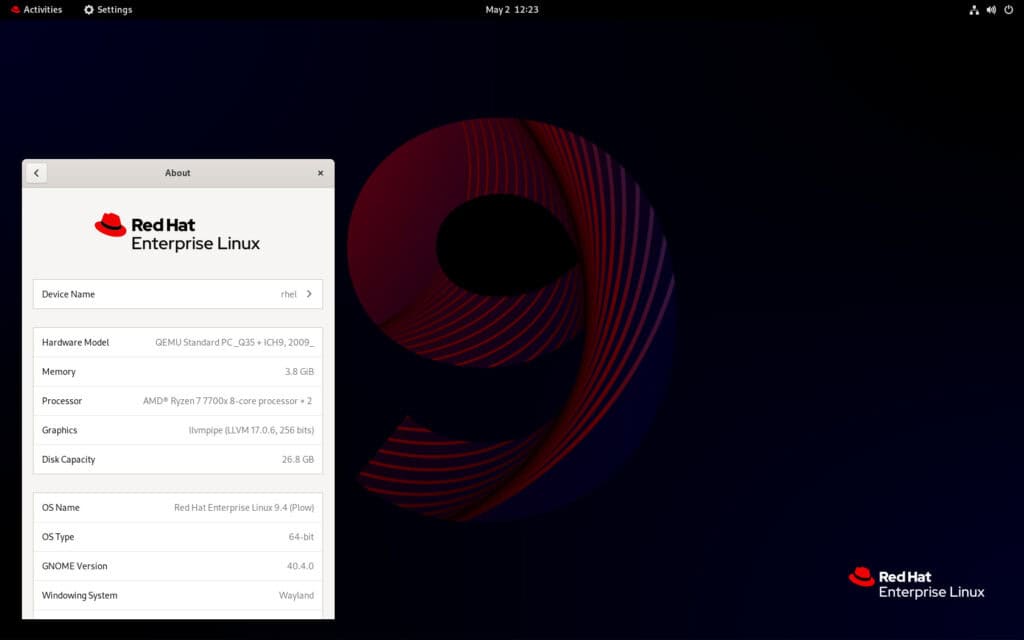Red Hat has officially released Red Hat Enterprise Linux (RHEL) 9.4, the fourth update to its flagship operating system nine series. This release brings a refreshed package base, enhanced performance, better security features, and increased support for cloud and edge computing.
What’s New in RHEL 9.4
Powered by Linux kernel 5.14, this release mainly focuses on the updated package base, with developers and those relying on containerized services in mind. Additionally, some security enhancements have also found their way into the RHEL 9.4 release. Here are the most important ones.

Enhanced Developer Tools and Languages
RHEL 9.4 features major enhancements in programming languages and developer tools. Python 3.12, the newest iteration of the popular programming language, introduces optimized cryptographic algorithms and a unique pre-interpreter global interpreter lock (GIL) to enhance performance.
Ruby enthusiasts will find Ruby 3.3 with its new Prism parser, which offers improved error tolerance and maintainability. PHP 8.2 also debuted in this version, including a range of new standalone types and a consolidated random number generation extension.
Database Improvements
RHEL 9.4 introduces MariaDB 10.11 and PostgreSQL 16 with several critical enhancements. MariaDB now supports a new UUID data type and enhanced SSL configuration capabilities. PostgreSQL 16 brings connection-level load balancing and improved regular expression capabilities, making database management more efficient.
Programming and Compilation Tools
The release includes updated Go, Rust, and LLVM versions, providing developers with the latest programming efficiency and flexibility. Go 1.21 introduces new built-in functions and enhanced type inference, while Rust 1.75 allows for more complex build-time expressions and improved trait implementations.
LLVM 17 rounds out the tooling updates with new optimization attributes and a streamlined pipeline for better performance.
Security and Compliance Features
Security in RHEL 9.4 has been beefed up to allow better control over system-wide cryptographic policies, including more refined MAC options for SSH. Updates to OpenSSL and the introduction of passkey authentication with FIDO2 compliance enhance the security framework, reinforcing Red Hat Enterprise Linux’s status as a leading platform for deploying sensitive and critical applications.
Edge and Container Management
RHEL 9.4 continues to support edge computing with FIPS-enabled image builds and improved container management tools. Podman 4.9 introduces on-demand module loading and new commands to support distributed container builds, enhancing the flexibility and efficiency of container management.
Identity and System Management Enhancements
The update also includes significant improvements to Red Hat’s identity management (IdM) and system roles. New IdM features integrate with external identity providers using OAuth2, and the system roles now support configurations for new PostgreSQL versions and SQL Server 2022, among other updates.
Refer to the release announcement for detailed information about all Red Hat Enterprise Linux 9.4 changes. As usual, updated versions of the leading RHEL forks, AlmaLinux and Rocky, are expected to be released in the upcoming days and weeks.
Finally, although RHEL is intended primarily for enterprise customers, it may be freely downloaded, installed, and used by any Linux enthusiast. All you need is registration on the Red Hat Developer Portal, and you will be entitled to the Red Hat Developer Subscription For Individuals, which allows you to register up to 16 machines.

Redhat is dead to me now.